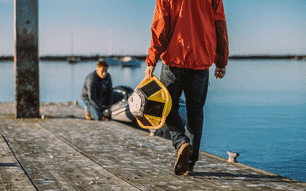In the lead up to the meeting, a Greenpeace investigation revealed that juvenile bigeye, skipjack and yellowfin tuna are being caught and unloaded at the General Santos fish port in the Philippines.
These juvenile fish are not only under the weight limit required by the FAO, they are also hugely important to the preservation of tuna stocks, some of which are heavily overfished.
“The world’s tuna stocks are in decline and nothing is being done to stop the catching of baby tunas - which are vital in keeping the fisheries alive. This is a direct result of the continued expansion of fishing fleets, and increasing fishing capacity and effort especially through the use of fish aggregating devices, (FADs), by purse seine vessels,” said Mark Dia, Regional Oceans Campaigner for Greenpeace Southeast Asia, and an observer at the WCPFC.
Speaking before the meeting, the WWF also stated that WCPFC members act on scientific advice and halve catches of the juvenile Pacific Bluefin.
Other measures that need to be taken to protect tuna stocks includes firm limits on the number of fishing vessels, the adoption of a long term stock recovery plan with biological reference point limits, and reductions in the reliance on FADs, said the WWF.
The meeting, resulted in no action on the management of FAD's, and no new or enhanced measures to prevent the overfishing of the endangered bigeye tuna.
According to The Pew Charitable Trusts, some action was however taken to start reducing shark bycatch in tuna fisheries and changes made to the Record of Fishing Vessels Standards Specifications and Procedures will help in tackling illegal fishing.
After the meeting, Greenpeace called for tuna traders and investors to fill the hole created by the WCPFC’s failure to manage Pacific tuna fisheries.
“In the absence of any real action at this week’s WCPFC meeting, the market end of the supply chain must use their influence to ensure both they and Pacific tuna have a future,” said Lagi Toribau of Greenpeace Australia Pacific.
Scientists from the US University of Massachusetts Amherst and Israel's Oceanographic and Limnological Research Center have used a new approach to determine the age of sexual maturity for wild stocks of western Atlantic bluefin tuna.
The research, which could lead to changes in how scientists estimate tuna population's, showed that Atlantic bluefin tuna mature at a considerably younger age than first thought.




